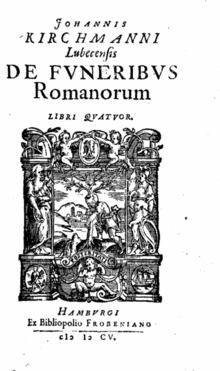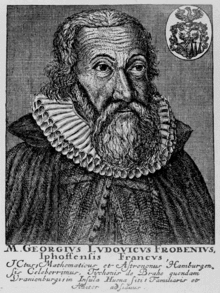Georg Ludwig Frobenius
Georg Ludwig Frobenius , latinized by Froben , (born August 25, 1566 in Iphofen ; † July 21, 1645 in Hamburg ) was a polyhistor , mathematician , bookseller and Hamburg publisher in the first half of the 17th century.
Life
Georg Ludwig was born as the son of the lawyer , councilor and mayor of Iphofen Bonifatius Frobenius (1537–1584) and studied at the universities of Wittenberg and Tübingen . In Wittenberg he obtained a master's degree in philosophy . In addition to law, the main areas of study and interests were mathematics and astronomy.
After his first position as private tutor with the Brandenburg Chancellor Wilhelm Megkbach, he applied to both Tycho Brahe and Heinrich Rantzau . First he got himself an experience of a particularly medieval kind at Tycho Brahe's at his Uranienborg castle on the Swedish island of Ven between Copenhagen and Landskrona in the Öresund . Due to the late arrival, he had to spend the night in the open in front of the raised drawbridge of Brahe. The next day, no agreement could be reached regarding the terms of a collaboration or Froben's further studies at Brahe. Brahe demanded six years of unpaid work on his projects. When Frobenius was unable to enter into this long bond, Brahe would not let him go either. So Frobenius had to leave the island of Ven by way of flight, leaving all his belongings behind. He then became tutor and secretary in the service of the Danish governor in Holstein Heinrich Rantzau. As a friend of Brahe, the latter also brought back the personal belongings that were forcibly left behind on the island of Ven. For four and a half fruitful years Frobenius was employed in Breitenburg, Segeberg and Wandsbek as the educator of Rantzau's grandchildren. During this time, Rantzau's book of consolation was written, the Epistolae consolatoriae , Froben was in charge of Peter Lindeberg's Hypotoposis , an illustrated directory of the buildings built by Rantzau, Rantzau's Calendarium ranzovianum with tables for calculating the calendar (in Denmark the calendar reform was carried out by Pope Gregory XIII , whose contemporary Rantzau was, only adopted in 1700 ), he helped compile the Tractatus astrologicus Rantzaus, and supported Rantzau in the creation of the political guide for King Christian IV of Denmark , the Tractatus bellicus , as well as with his booklet De origine Cimbrorum . In all of these works Froben is likely to have a fair amount of co-authorship.
After Froben's marriage to Margarethe Wittemborg in 1595 at the Wandesburg , he resigned from the service of the Danish governor and started his own business in Wandsbek as a tenant of Rantzau. With the death of Rantzau he gave up the lease again, moved to nearby Hamburg and acquired citizenship there for free in 1600 , which at that time was equivalent to an extraordinary distinction for a new citizen. In his publishing bookstore, Biblipolium Frobenianum , which was founded there, around 200 books and publications were published by around 1647, including the Hamburg city law of 1605 .

Works
- The literature on Frobenius is based on his handwritten autobiography, which, apart from excerpts from Zeeberg, is unpublished in the Danish Royal Library in Copenhagen (Georg Ludwig Frobenius: Fragment from the life story of Georg Ludwig Froben, written by hand ... [from May 1604], signature : NKS 2596 fol.).
- For an overview of his works as an author as well as a publisher, see the directory of the 16th century prints published in the German-speaking area (VD 16) and the directory of the 17th century prints published in the German-speaking area (VD 17) .
Remarks
- ↑ On the collaboration between Rantzaus u. a. with Froben see Peter Zeeberg: Heinrich Rantzau and his humanist collaborators p. 5 ff. [1] ; The fact that Rantzau's manuscript Cimbricae Chersonesi descriptio nova (New Description of the Cimbrian Peninsula) remained unprinted into the 18th century is probably due to the lack of interest in his family and the fact that at the end of his life he lacked a colleague from Froben's skill.
- ↑ Emblem: A tree planter with the signature "posteritati".
- ↑ p. 6 ff.
- ↑ there: NKS 2596 fol., Quoted from Zeeberg.
literature
- Friedrich Lorenz Hoffmann: The learned bookseller Georg Ludwig Frobenius in Hamburg. Hoffmann & Campe , Hamburg 1867.
- Peter Zeeberg: Heinrich Rantzau (1526-98) and his humanist collaborators. The examples of Reiner Reineccius and Georg Ludwig Froben , lecture in the congress "Germania latina - Latinitas teutonica, politics, science, humanistic culture from the late Middle Ages to our time", Munich, September 2001, see http: //www.phil-hum -ren.uni-muenchen.de/GermLat/Acta/Zeeberg.htm#_ftn35
- Otto Beneke: Frobenius, Georg Ludwig . In: Allgemeine Deutsche Biographie (ADB). Volume 8, Duncker & Humblot, Leipzig 1878, p. 126 f.
Web links
- Works by and about Georg Ludwig Frobenius in the German Digital Library
- Publications by and about Georg Ludwig Frobenius in VD 17 .
- Collection of the State and University Library Hamburg
| personal data | |
|---|---|
| SURNAME | Frobenius, Georg Ludwig |
| ALTERNATIVE NAMES | Froben, Georg Ludwig |
| BRIEF DESCRIPTION | German polyhistor , bookseller and publisher |
| DATE OF BIRTH | August 25, 1566 |
| PLACE OF BIRTH | Iphofen |
| DATE OF DEATH | July 21, 1645 |
| Place of death | Hamburg |
